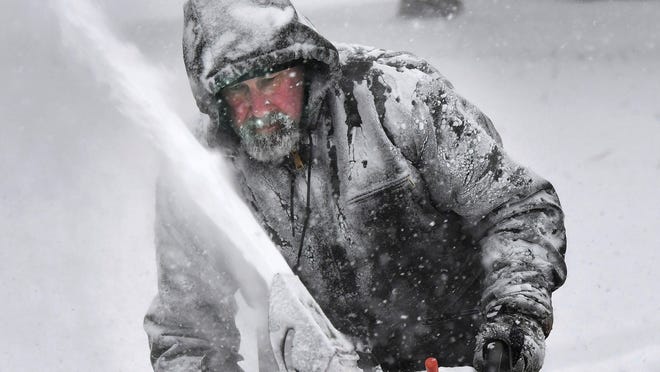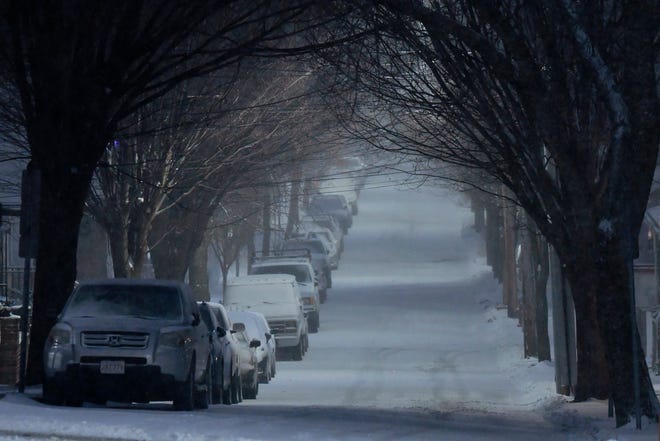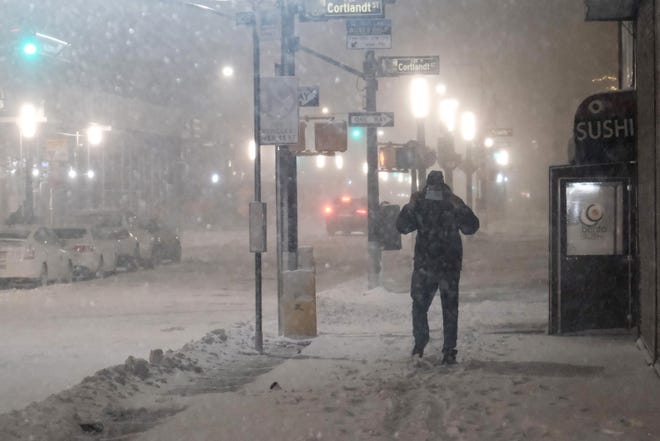
A powerful winter storm Saturday continued dumping snow on the Northeast as near-hurricane force winds led to more than 100,000 power outages, snarled travel and blizzard conditions near major cities.
Officials banned non-emergency travel in some areas and urged drivers to stay off roads. Meanwhile, thousands of flights were canceled Saturday as the storm hit, according to FlightAware. Newark Liberty International Airport in New Jersey said more than 85% of scheduled flights Saturday have been canceled due to the storm.
The storm also has the potential to shut down major highways and, with its gusty winds, may lead to widespread power outages in the Northeast.
More than 100,000 customers in Massachusetts were already without power Saturday morning, according to poweroutage.us. Additional power outages are likely in southern and eastern New England and elsewhere along the mid-Atlantic coast, AccuWeather said, encouraging people to be prepared for long outages and to have flashlights and blankets on hand.
Winter weather will spread from the mid-Atlantic coast to the Northeast coast throughout Saturday, according to the National Weather Service. The conditions are expected to taper off by Sunday as the storm moves into Canada, the NWS said.
Parts of 10 states were under blizzard warnings Saturday: Maine, New Hampshire, Massachusetts, Rhode Island, Connecticut, New York, New Jersey, Delaware, Maryland and Virginia. Major cities including Philadelphia, New York and Boston — as well as much of New England — are expected to bear the brunt of the storm, with wind gusts as high as 100 mph in some areas.
The Weather Service said the powerful nor'easter further developed overnight, calling the system a bomb cyclone — another name for the process known as bombogenesis.
The storm is "likely to be the strongest and most disruptive snowstorm and blizzard in several years for portions of New England and the immediate mid-Atlantic coast," AccuWeather said.
"This is going to be a dangerous, life-threatening storm, especially in southern New England," AccuWeather Chief Meteorologist Jon Porter said.
WHAT IS A NOR'EASTER:Storms can batter East Coast with snow, impact millions of people
People in the region woke up Saturday morning to snow accumulation already in the double digits, according to AccuWeather, and an additional 2 to 3 feet could fall in parts of New England.
Much of the Northeast coast will see snowfall accumulations of more than a foot, NWS said. Some regions will see as much as two to three inches of snowfall per hour, according to the weather service.
Cold temperatures and dangerous wind chills across the East following the storm may "exacerbate an already dangerous situation for those without power/heat," the NWS said.
Officials across the coast warned people to stay off roads as high winds and snow create potential whiteout conditions.
"Expect whiteout conditions and nearly impossible travel at times," the NWS said.
WHAT IS A BOMB CYCLONE?:A winter hurricane, explained.

Rhode Island banned nonemergency road travel starting Saturday morning, and Delaware allowed only essential personnel on roads in three counties. Massachusetts also banned heavy trucks on interstate highways for most of the day.
The Massachusetts Department of Transportation warned on Twitter that already difficult travel will worsen throughout the day.
"Avoid travel if possible," the department said. "If you must go out, take it slow & let crews treat/clear roads safely."
WHAT IS WIND CHILL?:Understanding the wind chill index and how it's calculated
Storm may set record in Boston
While Boston is no stranger to snowstorms, this weekend's storm is forecast to be the city's first blizzard since 2018 and may even become one of the largest on record, AccuWeather said.
If Boston sees 20 inches or more of snow, the storm could break into the city's top 10 snowfall slots, the weather service said. More than 24.6 inches could put it into the number one spot, over the previous record from January 2015.
AccuWeather has forecast 18 to 24 inches of snow in Boston.
Past major blizzards in the city include the President's Day Storm of 2003, which buried some areas under 30 inches of snow as Boston faced 27.6 inches, according to AccuWeather.

Contributing: Doyle Rice, USA TODAY; The Associated Press
Contact News Now Reporter Christine Fernando at [email protected] or follow her on Twitter at @christinetfern.










